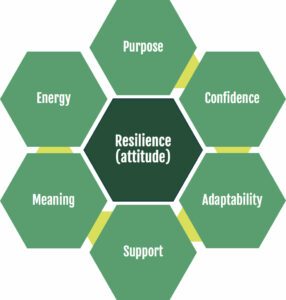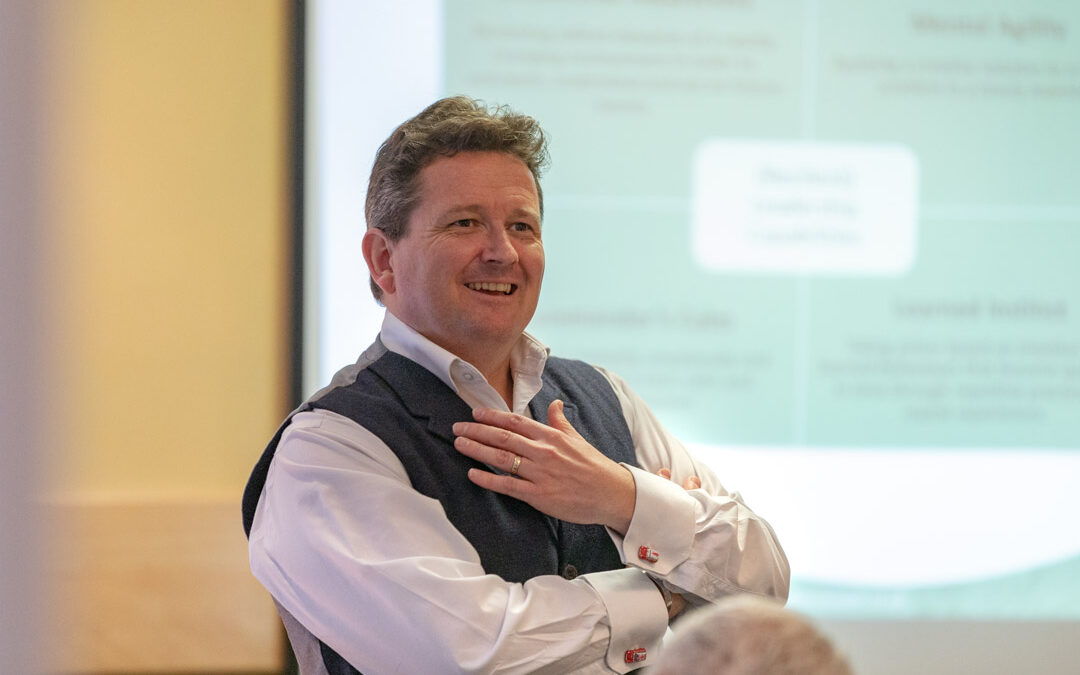Podcast: Play in new window | Download
Subscribe: Spotify | Email | RSS
Building Resilience with Coach, Facilitator and Speaker, Russell Harvey
In this week’s episode of The Leadership Habit podcast, Jenn DeWall talks to Russell Harvey about building resilience. A study by The Resilience Institute found that intentionally building resilience can increase vitality by 43%, focus by 38%, and optimism by 38%, and reduce symptoms of anxiety and distress by 39%. According to research by the World Health Organization, cultivating resilience through training at work can have an ROI of $4 for each dollar invested!
Don’t miss this episode featuring the expertise of coach and speaker Russell Harvey and Leadership Strategist Jenn DeWall as they discuss practical ways to build resilience in yourself and your team.
Meet Russell Harvey, Resilience Coach, Facilitator, and Public Speaker
Russell Harvey has over 20 years of experience in learning, leadership and organizational development and is influenced by positive psychology and a strengths-based approach to coaching. His purpose is to positively affect 100,000 people by the year 2025.
Russell focuses on resilience because he truly believes that building it is an opportunity for people to live and lead better lives.
What is Resilience?
As the episode opens, Jenn asks Russel to define resilience for the audience. Russel explains:
“So yeah, everyone, listen now. I’d like you to remember resilience in this way. Resilience is about springing forward with learning. I do hear, obviously, the words “bounce back” are used a great deal in relation to the word resilience. And just personally, I often think there’s a bit of a risk to that.
So, we face a challenging life event, then we sometimes say, oh, I’ve gotta bounce back. Now we sort of give a bit of a subconscious instruction to ourselves to go back to how we were. And in the nicest possible sense, we can’t. And clever people, an eye that stood the brain goes, yeah, your brain can’t go back.
So what you need to do from all of life’s experiences is get into the habit– whether it’s good experiences or not-so-good experiences– get into the habit of pausing and reflecting and re-energizing yourself.
In your reflections, you get your learning and making some options and choices about the things that you’re gonna keep doing because they work really well for you and some things that you are gonna stop doing because they haven’t worked well for you in recent times.
So when you do really great resilient reflection, then you actually understand the things that are and aren’t working for you and really find ways to play to your strengths as much as possible. So springing forward with learning is how I would love all your listeners to remember what the definition of resilience is.”
The Power of Reflection
Next, Jenn asks Russell about the importance of reflection in developing resilience. Russell shares his insights, saying:
“So I think it’s good to note that reflection is going on all the time. You know, apparently, we have about 50,000 thoughts a day, and over half of them are negative. So a thought is a reflection, and actually, 90% of my thoughts are from the previous day. And lo and behold, over half of those are negative.
So it’s understanding that any thought and feeling that you’re having is okay. Self-compassion: It’s all right to have the thoughts and feelings that you’re having. And how well do you notice the thoughts that you are having? You know, how much are you being kind to yourself, congratulating yourself, beating yourself up? You know, how self-aware are you that you are doing that? So we are reflecting all of the time because we are thinking all of the time.
And then it would be useful if you sort of consciously make the choice. If you’re not great at reflection, start making it a habit. So all habit-forming exercises, you’ve gotta do what works. So for some people that is daily, some people that’s weekly, some people that’s more consciously fortnightly with a friend, you know, but it’s actually do something a conscious around actually the reflection is what I would suggest to you.
You’ve gotta do what works, and you also have to understand you’ve gotta do it a few times. You’ve gotta repeat it to make sure that you understand what works well about it. So you’re gonna just do what works for you, but do something.”
Are you Coping, Surviving or Thriving?
Later in the episode, Jenn and Russell discuss how to build awareness about your current situation. Russell tells Jenn that the goal of building resilience is to be able to thrive, and Jenn asks how we can define what thriving looks like.
Russell recommends increasing your self-awareness by thinking about how you are really doing. He explains:
“It is about understanding how you are then going to shift from the coping, surviving into the thriving space by tapping into your strengths far more. And thinking about this question about how are you that we just talked about? You know, how you answer that question will be different about whether you’re thriving or surviving or coping. So it’ll give you some clues. So people even here now, you know, just get a blank piece of paper and do three columns. Coping, surviving and thriving.
And actually, just write down on these three columns. How do I know when I’m coping, surviving or thriving? Thriving? What am I like, and what do I say? How do I behave? How do people describe me in these different instances? And then, you could immediately give yourself some clues about where you might be.”
Then, they discuss how this tool is helpful for building more self-awareness and learning to recognize when you may be in a bad place and might need to take action to manage stress or reflect on what is going on. Jenn reminds the audience that everyone has ups and downs, so resilience isn’t about toxic positivity; it is about learning what works for you to move out of survival or coping mode in order to thrive.
The Resilience Wheel
Later, Russell shares another helpful tool for building resilience– The Resilience Wheel. Listeners can find the wheel on his website, or just draw it on a piece of paper. The idea is to score yourself in seven key areas:
Image borrowed from Russell Harvey, theresiliencecoach.co.uk:

Russell explains:
“Yeah, so we’ll talk about all seven, and I’ll just try and give a very brief little there example in each, some of it we’ve talked about already. It’s a bit of a self-assessment tool, just score yourself out of 10 or like put a color to it or a smiley face or, you know, different emoji.
#1 Resilience (Attitude)
So rate yourself in these different areas. So the heart of resiliency is our attitude. So right at the center of the wheel is our attitude.
And the thing that always fascinates me about that bit, is that our attitude includes our beliefs. I’d like people to remember that a belief is something that we behold to be true without basis in fact. So you’ve gotta challenge your beliefs a lot of the time with your attitude.
#2 Purpose
Then the next one is purpose. So it’s being curious about whether you actually have a purpose. And the purpose is a little bit more overarching than your goals. Goals help you achieve your purpose. So, my purpose is that by the year 2025, I want to positively affect 100,000 people. And right now, I’m up to 44,212, essentially.
I appreciate that there is some smart goal stuff in there, but the world likes to hear numbers and statistics, you know, so I put that in, and that drives me. It gets me outta bed. It helps me understand how well I need to be able to achieve that and what type of human I want to be. So that’s my purpose.
#3 Confidence
Then we’ve got confidence. Playing to your strengths builds natural confidence and resilience. So confidence is our balance of positive and negative thoughts.
#4 Adaptability
Then we’ve got the lovely word of adaptability. So that gets thrown around a huge amount of the time. So remember, the definition of adaptability is openness to change. And I’d like people who are listening now to remember that it doesn’t necessarily mean that you’re gonna do the change, that you’re open to it. Okay, so agile. So there’s a difference between adaptability and agile.
Agile means you can make the change quickly. You can make the decision to make the change quickly. So when you work on your openness, curiosity, and openness to new ways of doing things, it also helps you be more agile.
#5 Support
We then have our support network, which we’ve referenced a lot. Just make sure that you’ve got all the people in your life, a good balance of people that energize you and support you and tell your own truths.
And we will have to spend time in our lives with people that we don’t enjoy spending time with. Sometimes it’s family <laugh>. So it’s just about what’s your balance around that and get it into a good place.
#6 Meaning
Then there’s meaning, which we’ve talked an awful lot about today, about how do you answer that question about how are you, what’s your self-talk? So the stories we tell ourselves, because every time we answer the question “how are you”, we’re imprinting a muscle memory inside ourselves about if we’ve had a good experience or a bad experience, or I’m an okay person or I’m a terrible person. So the meaning that we attach to events.
#7 Energy
And finally, energy, which is going back to playing to your strengths. When I work with leaders, that is also the space where we are also thinking about wellbeing and diet and exercise that goes into the energy space. I’m not an expert on the diet and exercise piece, you know, but energy when I work with clients is far more about their strengths profile.
And so those seven aspects, and they’re all interconnected every time you engage with one of them and make it slightly better, it has positive knock on effects on all of the others. So I support clients on their resilience wheel.”
Where to Find More From Russell Harvey
Be sure to listen to the full episode to get more of Russell’s tips about how to build resilience. Jenn and Russell go on to discuss the connections between each part of the resilience, and learning to get comfortable with being uncomfortable! If you want to learn more about Russell and his work, you can connect with him at the resources below:





